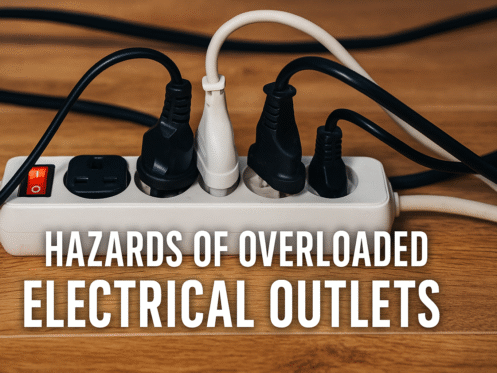What does it mean to overload your electrical outlet? It means drawing too much power to a specific point in your electrical system. This occurs when too many appliances and devices are plugged in simultaneously, and the electrical circuit is unable to handle the current flow safely.
Worried about your outlets? Need an upgrade? At High Five Plumbing, Heating, Cooling, and Electric, we offer emergency electrical services, electrical repairs, upgrades, and more. Call us for professional electrician services if you need a ceiling fan installed, an electrical panel repaired, or whole-home surge protection installed.
Our service area includes a wide range of communities throughout the Centennial State, including Boulder, Eldorado Springs, Eastlake, Indian Hills, Superior, Pinecliffe, and Westminster. We offer fast service to Denver-area residents, ensuring your residential electrical system is safe.
What Does It Mean To Overload an Electrical Outlet?
Your outlets are connected to an electrical circuit in your home, which is designed according to local building and fire codes. They’ve been created to handle a limited amount of electrical power.
An overloaded outlet can happen when you plug too many items into an electrical circuit, or use an extension cord to plug in more appliances or devices than the circuit can handle.
Each circuit in your home is made of wiring connected to the outlet, a breaker, and the devices or appliances you plug in. When each device runs, this adds to the power load put on the circuit. When the load exceeds the circuit rating, the breaker should trip and turn the power off at the source. If it doesn’t, the electrical system may overheat.
The Dangers of Overloaded Electrical Outlets
If you overload an electrical outlet in your home, you are putting your safety and the safety of your home at risk.
Fire hazards
An overloaded outlet produces a high level of heat due to excessive electrical current that exceeds the circuit capacity. The heat may damage the wire insulation and ignite any surrounding materials, leading to a house fire.
Electrical shock
If an outlet is overloaded, electricity may arc or find new pathways, especially if the insulation on the wires has melted. Because your body is an excellent electrical conductor, the electricity may jump to you, especially if you accidentally touch something connected to a bare wire.
Appliance damage
Overheating and power surges are both issues caused by outlet overload that can damage your appliances. Today’s modern appliances and computers are especially at risk, as they often have sensitive electrical components that can easily malfunction when exposed to too much electrical current at once.
Tripped circuit breakers
Circuit breakers are your home’s safety mechanism. If they trip (or if fuses blow) often, this is a sign that something is wrong with the electrical circuit, including an overloaded outlet.
Melting outlets and wires
Any sign of excessive heat around your electrical outlet is a serious safety concern. Overloading the outlet will cause a big power draw to the area, resulting in the wires overheating. This can melt plastic, burn insulation, and cause electrical fires if not dealt with swiftly.
Warning Signs of an Overloaded Outlet
The top warning signs that you have an overloaded outlet include:
- Tripping breakers/blown fuses: If your circuit breakers keep tripping when you use a specific outlet, this is a sign that it may be overloaded.
- Burning smells: Excessive current flowing through the wiring will eventually cause the insulation to overheat and start to smolder and burn.
- Low power: If there’s too much draw from one circuit, it could cause disruptions to the power output.
- Buzzing or crackling sounds: An overloaded outlet may cause the wiring to vibrate, creating a buzzing sound, or electricity may arc, causing crackling sounds. Both are signs to call an expert electrician ASAP.
- Warm or scorched-looking outlet covers: Overheating wires are a serious fire hazard. If you notice warm outlet covers or scorch marks, it’s safest to shut the power off and call for help.
- Dimming or flickering lights: If your lights dim or flicker when you turn on an appliance or device, you’re likely using more power than the circuit can handle.
How To Prevent Outlet Overload
Some simple steps you can take to prevent overloading your electrical outlets are:
- Assess power needs: Hire a qualified electrician to assess your needs and upgrade the system when necessary.
- Use multiple outlets: Distribute the load across multiple outlets whenever you can, to reduce strain on the circuit.
- Upgrade electrical systems: An expert electrician can install a circuit with a higher load rating to specific outlets, or upgrade your entire system to handle more power.
- Avoid overusing power strips: Power strips may be okay when you need to plug in multiple low-wattage items, but large appliances or multiple devices will overload the outlet.
- Unplug unused devices: Even when turned off, most devices will draw small amounts of power. Unplugging them will increase the available wattage (and save you money on your electric bill).
- Invest in smart power solutions: Using smart surge protectors, power strips with an “off” or “standby” switch, and other mo

